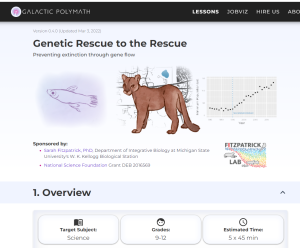“Genetic rescue” is a term that might sound at home in a sci-fi fantasy novel to the unfamiliar. On the contrary, it’s a technique quite grounded in real-world science and is a management strategy that can be used to conserve wildlife.
Many species are becoming endangered with the growing rates of habitat destruction and fragmentation across the world. These disturbances can simultaneously reduce populations to a small number of individuals and prevent those individuals from being connected to others. This can create many problems for those populations and increase the likelihood that they go extinct.
What is genetic rescue?
Genetic rescue is the process of increasing population growth with new genetic variation by migrating individuals into another small population (i.e., gene flow). In practice, wildlife managers take individuals from a larger, healthier population, and bring them to a smaller population to introduce new variation and eventually help grow the population. One of the most iconic success cases is the Florida panther, which nearly went extinct in the 1990s, until a genetic rescue event, which helped grow the now self-sustaining population to over 200 individuals.
There can be risks involved with moving animals around, so it’s often thought of as a last resort. Dr. Sarah Fitzpatrick, assistant professor at the W.K. Kellogg Biological Station, has been studying how genetic rescue can work on a model system (Trinidadian guppies) to tease apart the underlying dynamics of rescue events, in the hopes to inform how they might play out in real-world situations with endangered species. This work has uncovered the many potential benefits of genetic rescue, making it a viable option to save more species that could benefit from it.
Another thing Dr. Fitzpatrick discovered in her research, is that genetic rescue presents itself as a model process to explain concepts of evolution. Managers considering genetic rescue must think about three of the four main drivers of evolution: mutation, selection, genetic drift, and gene flow. In the classroom, selection is often the only topic discussed, and usually either regarding the medical field (e.g., antibiotic resistance) or over long timescales that are difficult to comprehend, such as speciation. However, evolution happens in short timescales (over a few generations) and has many implications outside the medical field, such as in conservation.
Tools for the classroom
To share this fascinating science with a broader audience, Dr. Fitzpatrick has partnered with Dr. Matt Wilkins, founder of Galactic Polymath to create an engaging, interactive set of lesson plans for middle and high school students that are free to teachers (explore the lesson here).
These lessons bring evolutionary concepts to life and create clear examples of how they are used in real-world conservation decisions. The five-day activity takes advantage of real scientific data from Florida panthers and Trinidadian guppies to expose students to theoretical concepts as well as practical outcomes of conservation management decisions.
Both Dr. Fitzpatrick and Dr. Wilkins will present the background and a brief walkthrough of these lessons at the 2022 KBS K-12 Summer Institute. The event is hosted on June 23, 2022, and K-12 teachers interested in participating can learn more here.
~~~~~~~~~~~~~~~~~~~~
Kyle Jaynes is a doctoral candidate in the Fitzpatrick Lab and a KBS and Science Education and Outreach Fellow at the W.K. Kellogg Biological Station.
~~~~~~~~~~~~~~~~~~~~

A legacy of conservation; a commitment to sustainability.
3700 E. Gull Lake Drive
Hickory Corners, MI 49060
(269) 671-5117
info@kbs.msu.edu